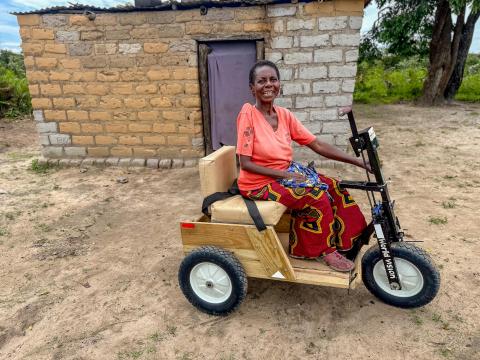A Light in the Darkness: Anto Mujinga’s Story of Survival and Hope

By Tatiana Ballay, Communications Officer
In Tshiyanda village, under the scorching sun of Lualaba Province in the Democratic Republic of Congo, Anto Mujinga begins each day on a mat laid directly on the floor of a small mud-walled hut. Cracks line the walls. A single bowl of water sits in the corner. The wind seeps through the openings, carrying with it the sounds of village life.
For over twenty years, Anto has lived here alone, surrounded by silence. Her right leg is paralyzed, her right arm useless. Each movement is a struggle. But her life wasn’t always this way.
Born in Mutshatsha, Anto’s childhood was filled with laughter and family warmth. At ten, she was sent to visit her uncle in Kolwezi. That’s when it began: a dull pain in her leg, a slow weakening of her arm. Her father sought doctors, but no one could offer a clear diagnosis or effective treatment. The condition crept in, irreversible and cruel, robbing her of movement and slowly, of her dreams.
As the years passed, Anto’s world narrowed. The chance to marry or raise children slipped away. Family ties frayed. Eventually, she was left entirely alone. Seeking a place away from judgment, she found refuge in Tshiyanda. Life here is simple and stripped bare. She survives with the help of a few kind neighbors and the occasional visit from local children who bring her cassava and warm laughter.
These children mean everything to her. Their visits are a reminder that she still matters, that she still belongs to a community. In their small acts of care, she finds strength.
Each week, neighbors bring her sacks of dried cassava. Anto patiently peels the tubers and saves the scraps the parts others throw away. She sells this cassava “bran” at the local market to pig farmers or families with few options. On a good day, she earns 2,000 Congolese francs ($0.80), It’s barely enough, but it helps her get by.
For nearly five years, Anto relied on a pair of crutches gifted by healthcare workers. But with one arm paralyzed, the crutches offered little independence. Each movement was painful. Often, she sat outside her hut, watching others pass by, waiting for someone to help her move just a few meters.
Her physical limitations made community participation nearly impossible. She couldn’t attend meetings or even make short journeys without assistance. She watched from a distance as village life moved forward without her.
Then, one day, everything changed.
Jean Nawej, another disabled resident of the village, brought her news: World Vision was distributing wheelchairs, and Anto was on the list. At first, she couldn’t believe it. Someone had remembered her?
On the day of the distribution, neighbors came to her hut. “Anto, come. They’re waiting for you.” With great effort, she used her crutches to reach the health center. There, she saw the wheelchair sturdy, practical, and full of promise. This wheelchair was a GIK (Gift In Kind) from World Vision.
As she touched the metal frame and the turning wheels, her eyes filled with tears.
“I haven’t had much help in my life but this wheelchair feels like someone just lit a light in my darkness. It feels like someone finally sees that I’m still here”, she whispered.
Though her paralysis remains, the wheelchair has changed her life. She can’t propel herself unaided, but the same village children who once brought her food now eagerly push her.
“These children are my legs, my arms, when they come, I feel alive again”, she says.
Now, Anto can leave her home. She visits the market. She greets neighbors, laughs, and reconnects. She plans to attend community meetings and share her story. She hopes it might inspire others, especially women, to believe that even after years of silence, it’s possible to reclaim a place in the world.
In this remote corner of Lualaba, Anto Mujinga has become a quiet symbol of resilience. Her life, once marked by invisibility and struggle, now carries a message of hope thanks not only to a wheelchair but to the power of community.
“This wheelchair isn’t just for me,” she says. “It gave me back my dignity. It made me visible again. And that’s the most precious gift of all.”
A Broader Picture
Anto’s story is not unique. Across Lualaba Province, many people with disabilities remain unseen, unsupported, and voiceless. In the Maisha program area alone, seven individuals with disabilities are registered: two in Mutshatsha, two in Tshiyanda, two in Kayembe, and one in Namwana.
These numbers may seem small, but they reflect a much larger issue one of systemic neglect and inaccessibility. For people like Anto, a simple tool like a wheelchair is not a luxury; it’s a lifeline.
The wheelchair she received is more than equipment. It symbolizes a shift, however modest, toward recognizing the dignity and humanity of all individuals, regardless of their physical limitations. It’s a sign that no one should be forgotten.
Behind every act of kindness lies a deeper truth: that hope, even in the most isolated corners, can be restored not by grand gestures, but by compassion, presence, and the courage to care.